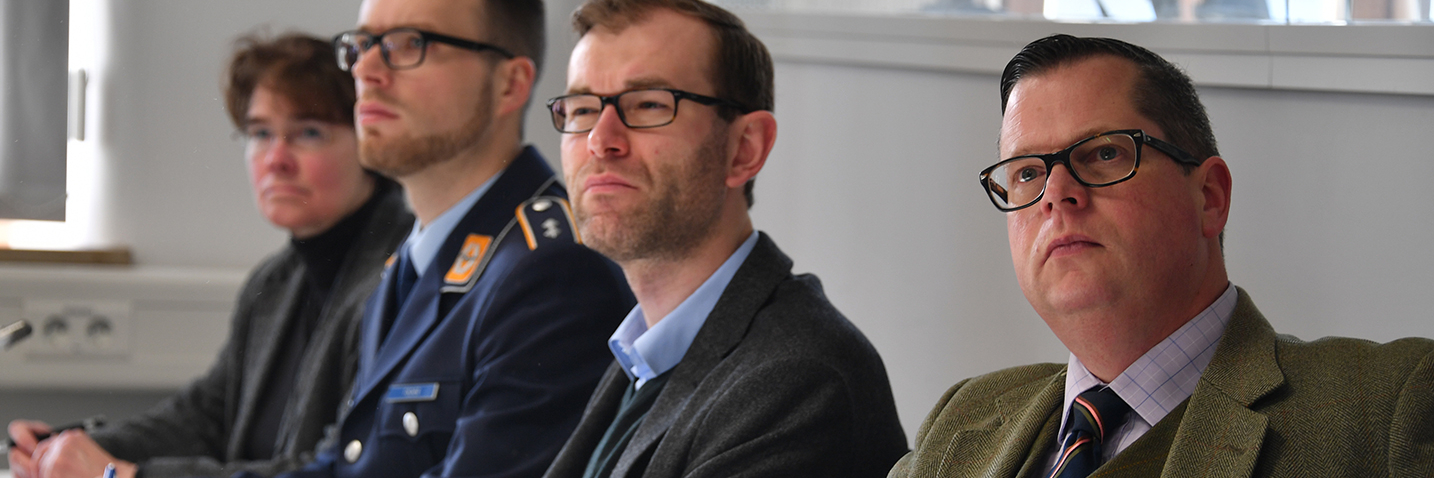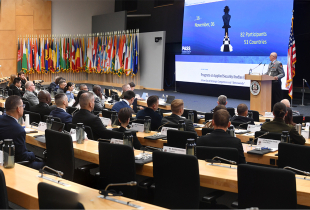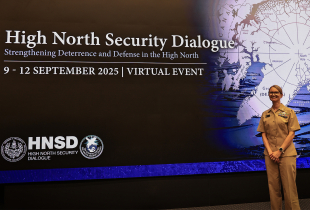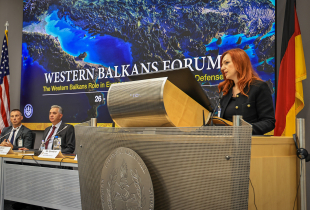
Arctic Security Challenges to Be Integrated Into Marshall Center Programs
By James Brooks
Public Affairs Office
George C. Marshall European Center for Security Studies
GARMISCH PARTENKIRCHEN, Germany (Feb. 8, 2017) - The security challenges of the Arctic region and how this region can be integrated into the Marshall Center programs was the focus of a two-day workshop held at the Center, Feb. 6-7.
Marshall Center German faculty and staff members listen to a presentation on Arctic Security challenges during a two-day workshop held at the Center, Feb. 6-7. The workshop was held to explore how the Arctic security environment can be integrated into Marshall Center programs.
Military, academic and government experts from Nordic and Baltic countries, U.S., Germany and Canada spent two days examining Arctic security challenges and economic opportunities brought on by the changing climate and technological advances from the perspectives of Germany, Baltics and Scandinavia, Sweden, U.S. and Canada, and Russia.
According to Marshall Center Dean Andrew Michta, the Arctic region is already emerging as a region of potential conflict as nations of the world begin to exploit the area for natural resources, transportation routes and more.
“We brought some of the leading experts in Arctic research here to have an open discussion about this area. We wanted to learn as much from them as they could learn as much about the Marshall Center, its programs, and how our 152 partner nation network can address the security challenges for a more peaceful and stable region,” said Michta.
Former Alaska Lt Governor Mead Treadwell was the workshop’s opening speaker. With both political and private sector experience with the polar region, Treadwell presented both political and economic realities of the region today.
“Today, 10,000 people pass through the Arctic region each day on ships and airplanes. The Arctic is an emerging market. According to the U.S. Geological Survey, more than 13 percent of the world’s undiscovered oil and 30 percent of natural gas reserves lie under the melting ice and many nations, especially Russia, want to exploit that. The Arctic feeds the world, it fuels the world, it provisions the world, it protects the world, it connects the world and it inspires the world. It’s an area of the world that is often misunderstood. And just when you think you understand this region, it changes. I think the Marshall Center, with its unique German-American partnership, is truly the right place to discuss the Arctic,” said Treadwell.
One of the Marshall faculty members who participated in two-day work shop was Dr. Ralf Roloff who is the Program Director for the center’s European Security Seminars East and European Security Seminar South. Roloff said it’s important for the Center to integrate the Arctic region into Center’s programs.
“I think we owe it to our stakeholders to examine the Arctic through our programs. Some of the aspects of the Arctic security challenge are related to what we examine now in our European Security Seminar-East. These Arctic challenges affect Russia and the Baltic nations with regards to border security and some other aspects which we work with now. Our Seminar on Regional Security involves many of the same countries and addresses resolving regional crisis before they become global in nature,” said Roloff. “I know the German government is very interested in the Arctic because the changing climate means an increase capacity and the opening of new sea routes. The German government increased their engagement on this topic about two years ago and as a German-American partnership, it makes sense to include this into our programs.”
Treadwell said that you can’t have a discussion about Arctic security without discussing the economics of the region. Arctic economies are forecast to grow by more than $500 billion by 2030, fueled by the opening of new sea routes, demand for resources and further development and technological advances.
“You need to make investments now to avoid conflicts later,” Treadwell said.
The Marshall Center will take the discussion from the Arctic workshop and determine how best to integrate the region into its programs.


